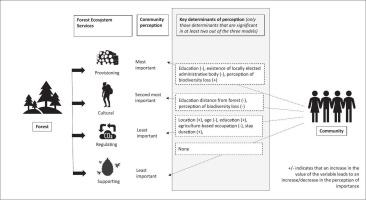乡村社区如何感知森林生态系统服务的相关性:来自印度喜马偕尔邦的见解
IF 3.8
2区 农林科学
Q1 ECONOMICS
引用次数: 0
摘要
本研究采用多变量有序概率回归(MVOR)模型分析了印度喜马偕尔邦村庄社区对森林生态系统服务(FES)感知的影响因素。它通过两种方式为学术贡献:第一,通过展示MVOR在有序框架内识别塑造感知的因素的应用,第二,通过探索使社区参与市场框架之外的可持续森林管理的驱动因素。结果显示,社区认识到提供服务的重要性最多(中位数排名=4),而调节和支持服务的重要性最少(中位数排名= 2)。支持服务的最高范围阈值(0 - 2.46)表明该FES是一个灰色区域,与阈值范围在0到1.2之间的调节服务不同。正规教育显著地(p < 0.05)倾向于帮助社区认识到FES的无形利益。这表明,学校课程应纳入生态系统服务的综合框架,同时也允许对当地主题进行更具体的讨论,以提高当地社区对规范和支持服务的价值的认识。该研究还强调赋予地方机构权力,以加强社区机构,使受过教育的青年更有意义地参与。它倡导将森林管理政策从惩罚性转向基于奖励的方法,帮助社区认识到保护的价值。对FES的偏好不受经济需求的显著影响(p > 0.05),这表明保护奖励应该考虑到经济以外的更广泛的利益。本文章由计算机程序翻译,如有差异,请以英文原文为准。

How village communities perceive the relevance of forest ecosystem services: Insights from Himachal Pradesh, India
This study on perception analysis uses a multivariate ordinal probit regression (MVOR) model to analyse the factors influencing the perception of village communities towards forest ecosystem services (FES) in Himachal Pradesh, India. It contributes to the scholarship in two ways: first, by demonstrating the application of the MVOR to identify factors shaping perception within an ordinal framework, and second, by exploring the drivers that involve communities in sustainable forest management outside the market framework. Results show the community recognises the importance of provisioning services the most (median rank =4) and regulating and supporting services the least (median ranks = 2). The highest ranging threshold values (0–2.46) for supporting services indicate that this FES is a grey area, unlike regulating service with thresholds ranging between 0 and 1.2. Formal education significantly (p < 0.05) tends to help the community appreciate the intangible benefits of FES. This suggests that the school curriculum should incorporate a comprehensive framework of ecosystem services, while also allowing for more specific discussions on local topics to promote greater awareness of the values of regulating and supporting services among local communities. The study also emphasises empowering local bodies to strengthen community agency with more meaningful participation of educated youth. It advocates for a shift in forest management policies from a punitive to a reward-based approach, helping communities recognise the value of conservation. The preference for FES is not significantly influenced by economic needs (p > 0.05), suggesting that conservation rewards should consider broader benefits that extend beyond financial.
求助全文
通过发布文献求助,成功后即可免费获取论文全文。
去求助
来源期刊

Forest Policy and Economics
农林科学-林学
CiteScore
9.00
自引率
7.50%
发文量
148
审稿时长
21.9 weeks
期刊介绍:
Forest Policy and Economics is a leading scientific journal that publishes peer-reviewed policy and economics research relating to forests, forested landscapes, forest-related industries, and other forest-relevant land uses. It also welcomes contributions from other social sciences and humanities perspectives that make clear theoretical, conceptual and methodological contributions to the existing state-of-the-art literature on forests and related land use systems. These disciplines include, but are not limited to, sociology, anthropology, human geography, history, jurisprudence, planning, development studies, and psychology research on forests. Forest Policy and Economics is global in scope and publishes multiple article types of high scientific standard. Acceptance for publication is subject to a double-blind peer-review process.
 求助内容:
求助内容: 应助结果提醒方式:
应助结果提醒方式:


